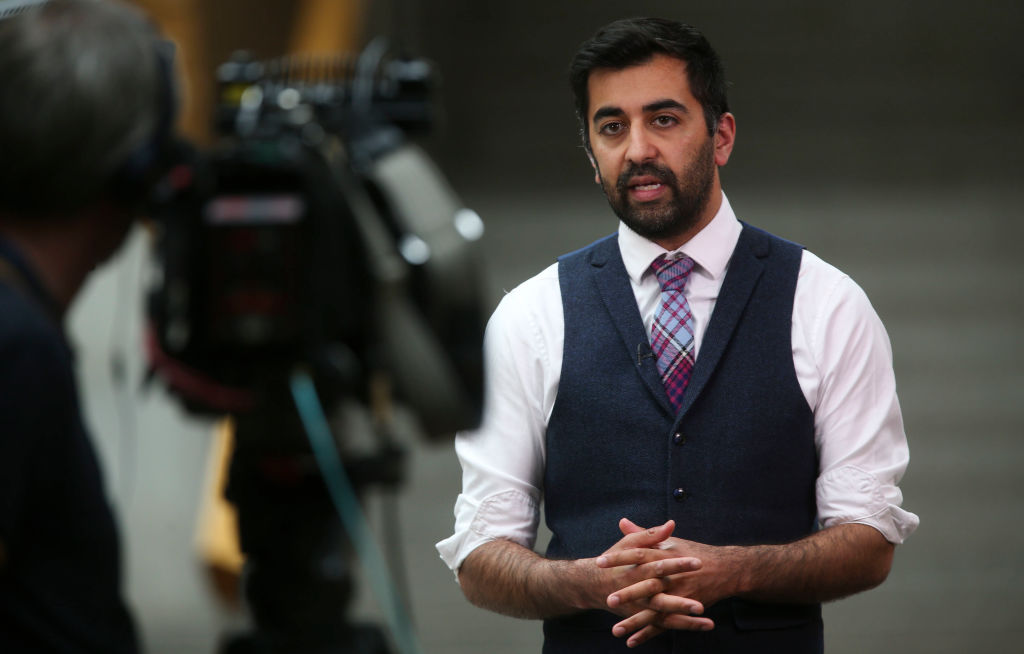‘Is that all there is?’ a dejected Peggy Lee mused in her sixties jazz number of the same name. Humza Yousaf’s statement in the Scottish parliament this afternoon left me musing along much the same lines, and no less dejectedly. The SNP justice minister had come to Holyrood with a peace offering for opponents of his hate crime bill, but it turned out to be half a piece at most. Such is the bill’s authoritarian overreach, it has prompted an unlikely alliance between Catholics and secularists, cops and lawyers, and, even more remarkably in Scotland, nationalists and unionists.
The draft legislation proposes to create a new offence of ‘stirring up hatred’ against a list of protected characteristics: ‘race, colour, nationality (including citizenship), or ethnic or national origins; […] age; disability; religion, or, in the case of a social or cultural group, perceived religious affiliation; sexual orientation; transgender identity; variations in sex characteristics’.
In the case of race, hatred is stirred up when a person ‘behaves in a threatening, abusive or insulting manner’ or ‘communicates’ such material, though the prohibition on ‘insulting’ speech and conduct is dropped for the other characteristics. The bill, as currently drafted, does not require an accused to have intended to stir up hatred for a conviction to be handed down; a jury need determine only that ‘it is likely that hatred will be stirred up’, and an accused can be jailed for up to seven years if found guilty.
Yousaf now proposes to amend his bill to require proof of intent. He explained:
‘I recognise that there is a real risk that if the offences don’t require intent to stir up hatred, people may self-censor their activities through a perception that the operation of this aspect of the offences may be used to prosecute what are entirely legitimate acts of expression.’
While this concession is welcome, it underscores both how dangerous this bill is and the disregard with which the Scottish government treats individual liberty. Up until a few hours ago, it was still going ahead with a provision its justice minister now admits could cause self-censorship and be perceived as a means for prosecuting ‘legitimate’ expression. Centuries-old liberties should not be hanging in the balance while a 35-year-old career politician ponders the scope of ‘legitimate’ speech.
Nor does this change address the fundamental flaws of Part II of the bill, which includes provisions for prosecuting actors and directors of plays deemed to stir up hatred and a prohibition on ‘possessing inflammatory material’. Part II is an all-out assault on freedom of expression and requiring intent doesn’t alter that. Those who revile Christianity don’t merely want to criticise it. They want to hate it, to hate those who practise and proselytise it, and to encourage others to hate them too. This may not be terribly nice but it is a matter for individual conscience and social convention, not state sanction.
The minister made some mildly encouraging noises and professed himself ‘keen to find common ground’ and willing to ‘look at other areas of the bill for possible reform’. We shall see. He needn’t make any further concessions to get his bill through Holyrood, a place with no great fondness for liberty. As much as it is a product of SNP illiberalism, the hate crime bill is also a creature of a weak parliament and substandard parliamentarians. That will become apparent in the next parliament, which will spend a good deal of its time reckoning with the unintended consequences legislated by its predecessor.
If Yousaf wants to avoid that eventuality, he will have to do much more than tinker with one section of the bill. Without radical reconstruction, Part II should be deleted in its entirety. Until it is, freedom of speech will remain under threat in Scotland.







Comments